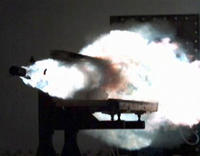-
Company develops telephone line “fingerprint” detector
Researchers at Pindrop, a new security company, have developed technology that can read telephone line “fingerprints” to prevent fraud and identify a caller
-
-
New cargo screening unveiled
Smiths Detection’s new HCVMe uses the power of a 4MeV X-ray accelerator and can scan loaded cargo containers with a steel penetration of 200 mm
-
-
New radiation sensor developed
Scientists have created one of the most advanced radiation sensors in the world: an X-ray detector that can reveal the composition of materials in a fraction of a second
-
-
Google's new privacy policy
“On its best day, with every ounce of technology the U.S. government could muster, it could not know a fraction as much about any of us as Google does now.”
Shelly Palmer, technology analyst -
-
Taser rolls out redesigned wearable cameras

Last week Taser, the manufacturers of the electric stun guns, unveiled its newly remodeled wearable camera system which is sleeker and more advanced than its predecessor; the Axon Flex, introduced less than a year after the company rolled out its first wearable cameras, represents a significant upgrade
-
-
U.S. Navy tests electromagnetic railgun launcher

The electromagnetic railgun launcher is a long-range weapon that fires projectiles using electricity instead of chemical propellants; magnetic fields created by high electrical currents accelerate a sliding metal conductor, or armature, between two rails to launch projectiles at 4,500 mph to 5,600 mph; the new railgun will allow the U.S. Navy to conduct precise, long-range naval surface fire support for land strikes, ship self-defense against cruise and ballistic missiles, and surface warfare to deter enemy vessels
-
-
Smartphone biometric security market set to grow five-fold in three years
A new report projects that the market for mobile phone biometrics will grow more than five times in the next three years
-
-
Startup developing eye blood vessel biometrics
Smartphone users could soon be using the whites of their eyes as their passwords. EyeVerify, a Kansas City-based startup, has developed eye biometrics that use a smartphone’s camera to analyze a user’s blood vessels around their irises
-
-
Cheaper natural gas leads to reduced U.S. carbon emissions
In the United States, lower emission from power plants in 2009 was driven by competitive pricing of natural gas versus coal; Harvard University researchers develop a model which identifies the relationship between the cost of electricity generation from coal and gas and the fraction of electricity generated from coal
-
-
Universal Detection developing smartphone radiation scanner for food
In the wake of Japan’s nuclear disaster at the Fukushima Daiichi atomic energy plant, concerns over contaminated food supplies have swept the nation, sparking Universal Detection Technology to develop a smartphone radiation detector specifically designed for comestibles
-
-
SOUTHCOM deploys radar that sees through foliage, rain, darkness, and dust storms
Lockheed Martin’s TRACER is a light weight, low-frequency synthetic-aperture radar that can peer through foliage, rain, darkness, dust storms, or atmospheric haze to provide real-time, high-quality tactical ground imagery; U.S. Southern Command has just deployed the penetrating radar to support the Command’s counter-terrorism and humanitarian assistance missions, and disaster relief operations
-
-
E-Verify Self Check now available nationwide

Starting yesterday, job hunters in every state across the United States can use Self Check to confirm their employment eligibility status
-
-
Middle school robotics team develops solution to food poisoning

A group of eight middle school students in California has developed an electrolyzed water vending machine that can cheaply and effectively reduce food contamination
-
-
Demand for Israeli security solutions remains strong -- and is growing
Homeland Security NewsWire’s executive editor Eugene K. Chow recently spoke with Koby Tanzer, a partner at Indigo Strategic Partners, an investment firm that specializes in the Israeli security and defense sector; in the interview, Tanzer discusses Indigo’s investment philosophy, how the global recession has affected defense and homeland security spending, trends in the global homeland security market, mobile device-based security solutions, and more
-
-
Kansas fights to keep bio lab project alive

Still reeling from the shock of finding out that the administration’s budget proposal does not contain any construction funds for the $650 million Bio Lab Level 4 facility in their state, Kansas political and business leaders vowed to fight to keep the project alive, including looking for alternative funding sources; the bio lab was considered the anchor of what is called an Animal Health Corridor stretching from Kansas State University in Manhattan, Kansas, to the University of Missouri in Columbia, Missouri
-
More headlines
The long view
Factories First: Winning the Drone War Before It Starts
Wars are won by factories before they are won on the battlefield,Martin C. Feldmann writes, noting that the United States lacks the manufacturing depth for the coming drone age. Rectifying this situation “will take far more than procurement tweaks,” Feldmann writes. “It demands a national-level, wartime-scale industrial mobilization.”
Trump Is Fast-Tracking New Coal Mines — Even When They Don’t Make Economic Sense
In Appalachian Tennessee, mines shut down and couldn’t pay their debts. Now a new one is opening under the guise of an “energy emergency.”
Smaller Nuclear Reactors Spark Renewed Interest in a Once-Shunned Energy Source
In the past two years, half the states have taken action to promote nuclear power, from creating nuclear task forces to integrating nuclear into long-term energy plans.
